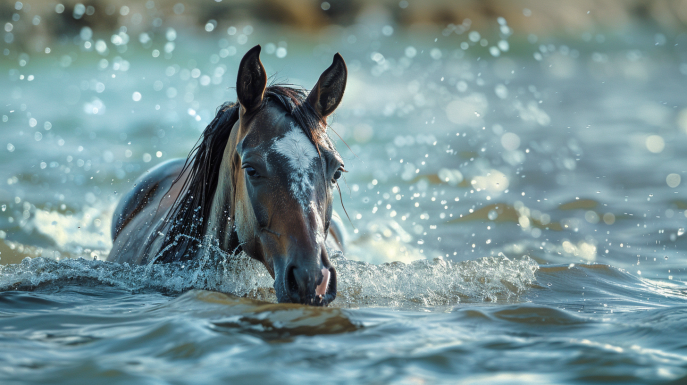Horses are majestic and versatile animals known for their speed, strength, and grace on land. But what about in water? Can horses swim? The answer is yes, horses can swim. However, several important factors must be considered before getting your horse in the water. In this blog post, we will explore the swimming abilities of horses, the benefits and risks of swimming, and tips for safely introducing your horse to water.
“Can horses swim?” This question often arises for horse owners looking to introduce their equine companions to aquatic environments. I remember the first time I took my horse to a lake. He was hesitant at first, unsure about stepping into the water. With some gentle encouragement, he slowly walked in and soon started paddling confidently. It’s essential to introduce horses to water gradually, ensuring the area is safe with no strong currents or hidden obstacles. Always watch for signs of stress and never force them in. Horses often feel more comfortable seeing a companion horse in the water. Taking a horse into the water can be a delightful experience but requires patience and careful preparation.
Horses can swim and float naturally without needing any training. They instinctively move their legs in a motion similar to trotting to help them navigate through the water. Still, before you introduce your horse to water, it’s important to consider safety precautions. The American Association of Equine Practitioners recommends starting in shallow, calm waters to help your horse gain confidence, as they might be initially hesitant (AAEP, 2023). However, this doesn’t mean that all horses are excellent swimmers or enjoy being in the water. Here’s what you need to know about horses and water…
How Do Horses Swim?
Like other mammals, horses have an instinct to swim when they go into the water. So, can horses swim? The answer is yes; they can swim in rivers, lakes, and oceans. When horses are in the water, their technique resembles that of dogs, kicking and pushing forward using their legs.
When submerged in the water, horses instinctively lift their heads over the surface to breathe. Their legs typically move by trotting through the water in a paddle-like manner – the same way they trot on dry land – to maintain their balance and stability in the water. Swimming is physically exhausting for horses due to the natural resistance water provides. Still, it benefits their fitness and is a fun activity once they are confident in the water.
Now you may wonder, can horses breathe underwater or hold their breath? Let’s find out.
Can Horses Breathe Underwater?
Unlike humans, horses cannot hold their breath underwater. They can easily get stressed if their head is under the water. So, if it’s a windy day with big waves, it can be dangerous for your horse to swim, and the risk of drowning is relatively high.
Therefore, checking the ocean or any swimming area before taking your horse into it is critical. Water might run into the ears if your horse gets its head underwater. Since the horse’s ears’ anatomy has no lower passage that will drain the water, it will build up inside them and cause discomfort and infection. So, it’s crucial to avoid water from getting into their cavity.
But even if horses have a natural swimming ability, it doesn’t mean they love water. Some have a phobia of it. Here are some of the reasons why:
Can You Ride a Horse While It’s Swimming?
Yes, riding a horse while swimming is possible, but it can be hard and dangerous for the horse. You need to ensure you’re not getting in your horse’s way and hindering its movement, especially its head. Therefore, you should avoid pulling the reins, and if you need something to hold on to, you may grab the mane for support. It must be able to move freely to lift its head above waves and minimize the risk of drowning. Take note that if your horse starts to paw at the ground, you must jump off quickly because most equines like to take a roll after getting out of the water.
Can Horses Swim in an Open Ocean?
Horses can swim in an open sea or ocean, but it can be dangerous if you aren’t prepared or careful and can’t swim yourself. With that said, you must learn how to swim first before bringing your horse into the water, and it is more advisable to go with other riders, too, as horses tend to enjoy swimming with other horses. You’d also have someone you can count on since they can lend a helping hand if something does happen in the water.
We also recommend considering the following before riding your horse in the ocean:
- Depth of the water — You need to check if you can get into the shallow water quickly and if the water gets deep slowly or has a sudden drop. Your horse may find it challenging to find footing if it has sudden dips.
- The ocean bed — Hard and uneven ground may hurt your horse’s legs, so it’s necessary to check if the ocean bed is made of sand, rocks, or coral.
- Obstacles in the water — Motorboats and even benign driftwood can scare or frighten a horse, so this should also be considered.
- Waves — If the waves are too big and your horse cannot keep its head above them, we advise against swimming in these conditions.
- The current — Strong currents can cause their energy levels to drop quickly. So, if this is the case, you shouldn’t go any further than the horse’s knee length.
- The rules of the area — Horses might be restricted in some beach areas or shorelines, so you must check beforehand.
- Water safety — You must also check if there are toxic organisms like cyanobacteria or blue algae in the area. You might also have to look out for jellyfish, turtles, or even leeches in the water.
- Other people — You also need to ensure that your horse won’t disturb the swimmers or bathers on the beach your horse is swimming if the beach is for everyone.
How Long Can Horses Swim?
Swimming is a tiring activity for a horse, and the strength and effort equines exerted during a 10-minute swim can be equal to cantering for several miles. So, they shouldn’t swim longer than 10 minutes to avoid injuries or extreme fatigue. Let’s not forget what happened to the 5-year-old Australian racehorse Rebel Rover, who dumped his jockey and headed into Moreton Bay, a 2 hours swim away. Water police and volunteers had to rescue him after getting too fatigued to continue swimming in the middle of the ocean.
Horse’s Fear of Water
Some domestic horses surrounded by water since birth are comfortable with swimming. But those not exposed to the water from a young age can be very wary and even scared of the water. Here are some reasons why they might be afraid of water:
- The horse’s eyes are located on two sides of the horse’s head, which is advantageous because it helps them see a broad scope of their surroundings. However, its downside is it prevents them from perceiving details. Thus, they naturally feel scared and vulnerable when wading into the water because they are unaware of what’s beneath it.
- Horses with bad experiences or past traumas in the water may associate it with something negative. So, bathing and swimming will be more difficult for them.
- Like other animals, such as cats and dogs, some horses don’t like being wet.
This process cannot be rushed, but how can you help your horse overcome its fears?
The first time a horse experiences being in water or swimming is essential because it’ll shape the horse’s confidence in the water as they mature. So, if your horse had a bad experience in water in the past, it will be afraid and may struggle to swim in the future. It would be best to slowly introduce your horse to water and let it enjoy the experience rather than training it to swim. Swimming will come as a natural response to the horse.
If your horse is afraid of the water, you can try persuading it that the water is in a safe, fun environment with other horses. Horses are friendly animals, and if they see that their fellow creatures are enjoying the sea, their fear will gradually disappear.
Safety Tips in the Water
Swimming with your horse is fun, but it also poses several risks, especially if you’re in an ocean with large waves. So, here are some of the precautionary measures that you must do ahead of time before taking your horse into the water:
- Use a bridle and lead rope, and make sure you can move your horse’s shoulder away on cue.
- Ensure that there are no obstacles in the swimming area and no steep drop-offs underwater.
- Check if the seafloor has sand, stones, or coral when swimming in the ocean. Hard and uneven surfaces may hurt and injure your horse’s legs and hoofs while swimming.
- Horses can’t breathe underwater, so it would be best not to swim in the sea if the waves are enormous enough to wash over their heads.
- Remove your horse’s saddle and other equipment that restricts their heads’ upward position as they need free rein to hold it above the surface.
- Get your horse to wade into the water slowly and come out before it feels nervous.
- Let your horse lunge in a circle partly in the water and mainly on the shore.
- When swimming, stay forward of the horse’s wither to avoid getting accidental kicks with its legs.
- Don’t swim for too long. Ten minutes in the water is enough. Since it’s a physically demanding activity, it would be best not to overdo it. Take your horse to the beach after 5 or 7 minutes to take a break and check if its breathing returns to normal quickly.
Benefits of Swimming for Horses
Swimming can offer several advantages to your horse and is often used to train and rehabilitate horses. Here are the perks of spending time in the water with your horse:
It’s an excellent aerobic and cardiovascular exercise
Swimming allows horses to move their legs intensively and increase their limb’s range of motion, which also helps to build their core muscles. Swimming is part of the physiotherapy regimes in many equine pools. It’s a beneficial exercise that enhances muscle growth and heals horses’ serious injuries without carrying their weight or putting unnecessary strain on their bodies during rehabilitation. The water’s resistance will also encourage them to work harder, thus strengthening their heart and lungs and improving their stamina.
It can strengthen your bond with your pet.
Swimming is a fun activity that can help you develop a closer relationship with your horse. If you can help your horse overcome its fear of water, it will build trust and an even stronger bond between you and your horse.
So, why not try to create new memories with your horse by swimming together? It’ll be challenging initially, but you’ll have a great time. Remember not to go to any swimming area alone with your horse. Having an experienced companion who can assist you anytime would be best. Check out our posts on ‘How Horses Swim’ & ‘Best Places to Swim on Horseback’ for more helpful information and tips on how, when, and where to swim with your horse.





